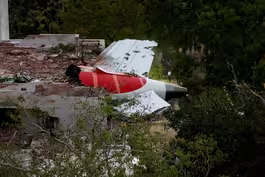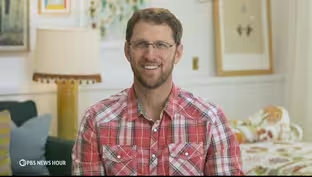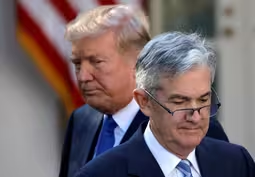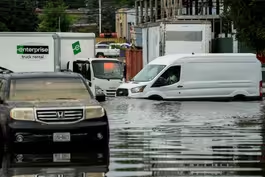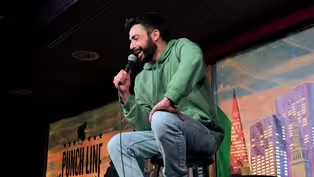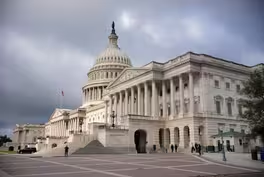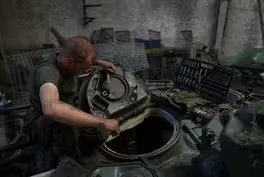
U.S. projects bringing water to drought-ridden land may end
Clip: 7/15/2025 | 8m 55sVideo has Closed Captions
Projects bringing water to drought-ridden land could end with USAID's dismantling
As the Trump administration ends USAID's mission, a project to bring water to drought-ridden lands is now in peril. In partnership with the Pulitzer Center, William Brangham and producer Molly Knight Raskin traveled to a community in central Kenya to look at the legacy of American foreign aid.
Problems playing video? | Closed Captioning Feedback
Problems playing video? | Closed Captioning Feedback
Major corporate funding for the PBS News Hour is provided by BDO, BNSF, Consumer Cellular, American Cruise Lines, and Raymond James. Funding for the PBS NewsHour Weekend is provided by...

U.S. projects bringing water to drought-ridden land may end
Clip: 7/15/2025 | 8m 55sVideo has Closed Captions
As the Trump administration ends USAID's mission, a project to bring water to drought-ridden lands is now in peril. In partnership with the Pulitzer Center, William Brangham and producer Molly Knight Raskin traveled to a community in central Kenya to look at the legacy of American foreign aid.
Problems playing video? | Closed Captioning Feedback
How to Watch PBS News Hour
PBS News Hour is available to stream on pbs.org and the free PBS App, available on iPhone, Apple TV, Android TV, Android smartphones, Amazon Fire TV, Amazon Fire Tablet, Roku, Samsung Smart TV, and Vizio.
Providing Support for PBS.org
Learn Moreabout PBS online sponsorshipWILLIAM BRANGHAM: We return now to our periodic look at the consequences of the Trump administration's dismantling of USAID.
In previous reports, we looked at how these cuts are impacting the fight against HIV, malaria and maternal health.
As America's work abroad contracts, which of USAID's investments and projects can live on without American support?
In partnership with the Pulitzer Center, producer Molly Knight Raskin and I traveled to a community in Central Kenya to look at the legacy of two American aid projects.
For the millions of herders across Africa, livestock is their source of wealth and survival.
And that survival depends on water.
While the rainy season just ended in Isiolo County in Northeastern Kenya, the land here is normally arid and dry.
Water is scarce and competition for it can be fierce.
ESTHER LOJOKIN, Farmer (through translator): We have had an bad water shortage here for a long time.
It's led to a lot of fights with our neighbors.
WILLIAM BRANGHAM: Those fights have been made worse by increasing droughts, driven in part by climate change.
During the last one, no meaningful rain fell for five consecutive growing seasons.
Tens of thousands of cattle died.
Food ran short.
And violence broke out when herders fought and killed each other, and nearby farmers.
MAN: Enough is enough.
They have crossed the red line.
WILLIAM BRANGHAM: The government sent soldiers to quell the violence.
It was in these circumstances, and in these areas, like the little village of Attan in Isiolo, where America targeted its help.
So, USAID, after working in close consultation with this community, had an idea, which was to build a system to guarantee more regular access to water, and thereby improve the quality of these herder communities' lives.
Last year, the regional head of USAID celebrated with community members and local officials the opening of a pilot project which dug a large well, filled a solar-powered water tower, and then sent water into troughs for cattle, nearby fields, and this water station.
They also taught people, including young herders, farming skills, and gave them start-up supplies.
The project gave this parched village new hope.
JULIUS EIRA, Farmer (through translator): We embraced crop farming.
The foreign aid from America chipped in to save us, by improving our farming techniques and giving us seeds.
WILLIAM BRANGHAM: Julius Eira is one of those men who started planting.
JULIUS EIRA (through translator): Our young men used to steal livestock from our neighbors, but when farming started, our young men embraced it, and stopped stealing.
And everyone was peaceful, all because of the American support.
ESTHER LOJOKIN (through translator): No one knew how to farm crops in this village.
I never dreamt of becoming a farmer.
I was raised to make charcoal.
WILLIAM BRANGHAM: Like most women here, Esther Lojokin used to make and sell charcoal for money, a practice that's destructive to forests and people's lungs.
But with support from this project, she walked away from that life and started farming ESTHER LOJOKIN (through translator): We can grow food from our soil, like maize, beans, and even sweet potatoes.
And our children appear healthy and strong.
MANSUR SHABAN, Agricultural Director, Isiolo County: It has given them a change of mind-set.
WILLIAM BRANGHAM: Mansur Shaban is the local government's agricultural director.
MANSUR SHABAN: They had very, like, little to none ways of making a livelihood.
And that would mean that they have to compete for the small resources they have with other people.
And that would mean life or death, because they were fighting for resources.
Let no one lie to you, highly impactful, lifesaving, because everybody knows that water is life, basically.
WILLIAM BRANGHAM: This project serves an unstated, but secondary purpose.
This region is a known recruiting ground for Al-Shabaab, the Somalia-based insurgency responsible for multiple terrorist attacks inside Kenya.
WOMAN: This father remembers the day his son went to Somalia to join Al-Shabaab.
WILLIAM BRANGHAM: Any project that helps support and anchor young men to their community is, according to the U.N., an important part of counterterrorism.
USAID's and other donors' plan was to considerably expand the project to pipe well water further, so triple the acreage could be farmed.
More training and supplies were to come, along with a large dammed basin to capture and store rainwater.
But then, only two years into the project, USAID's work was stopped.
So what this community was left with is a project that was showing tremendous promise, was benefiting dozens of families in this area.
But now, because of these cuts, this project will likely never be finished.
Contrast that with this.
The Isiolo Livestock Market was started over 10 years ago with large support from USAID.
Today, it's a bustling, thriving monument to economic empowerment and organization.
Two days a week, herders from across the region come here to sell their livestock.
Different tribes of different faiths haggle and negotiate in a free, secure, and open marketplace.
Mohammed Wario oversees the market.
He says that, for many years, herders would often get taken advantage of by dishonest brokers who would lie to them about market prices.
But, here, with so many customers bidding, herders get the best, fairest prices.
People can change money through a supervised system.
And because of the guaranteed crowds, a perimeter marketplace was built for local women to sell products.
MOHAMMED WARIO, Chairman, Isiolo Livestock Market: More than 5,000 households benefit every day through this market.
So this is a sustainability project, through USAID, which changed the livelihoods of our people.
WILLIAM BRANGHAM: Seeing this remarkable growth, the local government then helped fund the construction of a soon-to-open multimillion-dollar slaughterhouse, so buyers can butcher their meat on the spot, have it packed up, and shipped from the local airport.
So it's this kind of process that USAID starts, but hen the local government and local community picks up, that gives people hope that this kind of a project could sustain even if America's support never returns.
But just 15 miles away, in Attan, it's a different story.
Locals say the well isn't generating enough water anymore, and USAID has left.
Residents hand-dug this long channel from a nearby river, but they fear its only a temporary fix.
JULIUS EIRA (through translator): The American withdrawal came as a big shock.
We never expected it.
We were hoping for a dam, but our expectations died instantly.
Other people lost hope and stopped farming.
WILLIAM BRANGHAM: Esther Lojokin fears that the fledgling progress they have made will be lost.
ESTHER LOJOKIN (through translator): We're worried about what will happen in the future.
Even the crops in the ground will not mature.
The river is drying up, and there's not enough water in the well.
I can't imagine going back to charcoal.
MANSUR SHABAN: With the pullout of USAID, there will be a lot of dire consequences, in terms of health, in terms of livelihoods.
There will be a lot of consequences.
People will even die because... WILLIAM BRANGHAM: Do you believe people will die because of these cuts?
MANSUR SHABAN: Of course, because these projects had not become sustainable by the time USAID pulled out.
They were... WILLIAM BRANGHAM: They were getting close.
MANSUR SHABAN: Yes, the journey was there, but the pullout was so sudden that people were not ready for self-reliance yet.
WILLIAM BRANGHAM: Two USAID projects, two different outcomes.
In one, American aid was a seed, one that was given time and grew into a sustainable, thriving enterprise, the other a promising start that was interrupted, leaving more despair than hope in its wake.
For the "PBS News Hour," I'm William Brangham in Isiolo County, Kenya.
Air India crash report raises questions about pilots
Video has Closed Captions
Clip: 7/15/2025 | 6m 22s | Air India crash report raises questions about mental health care for pilots (6m 22s)
A Brief But Spectacular take on agrivoltaics
Video has Closed Captions
Clip: 7/15/2025 | 3m 1s | A Brief But Spectacular take on agrivoltaics (3m 1s)
How inflation, Trump complicate Fed's interest rate decision
Video has Closed Captions
Clip: 7/15/2025 | 6m 39s | How an inflation uptick and Trump's pressure complicate the Fed's interest rate decision (6m 39s)
News Wrap: 2 killed in New Jersey flash flood
Video has Closed Captions
Clip: 7/15/2025 | 5m 44s | News Wrap: 2 killed in New Jersey after vehicle swept away in flash flood (5m 44s)
Palestinian American comic uses humor to process war in Gaza
Video has Closed Captions
Clip: 7/15/2025 | 6m 55s | Palestinian American comedian uses humor to process the war in Gaza (6m 55s)
PEPFAR may escape White House attempt to cut its budget
Video has Closed Captions
Clip: 7/15/2025 | 5m 44s | AIDS program PEPFAR may escape White House attempt to cut its budget (5m 44s)
Will Trump's shift on Ukraine help end war? Experts weigh in
Video has Closed Captions
Clip: 7/15/2025 | 8m 37s | Will Trump's shift on arming Ukraine help end Russia's invasion? Experts weigh in (8m 37s)
Providing Support for PBS.org
Learn Moreabout PBS online sponsorshipSupport for PBS provided by:
Major corporate funding for the PBS News Hour is provided by BDO, BNSF, Consumer Cellular, American Cruise Lines, and Raymond James. Funding for the PBS NewsHour Weekend is provided by...
